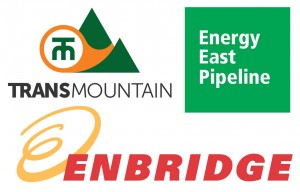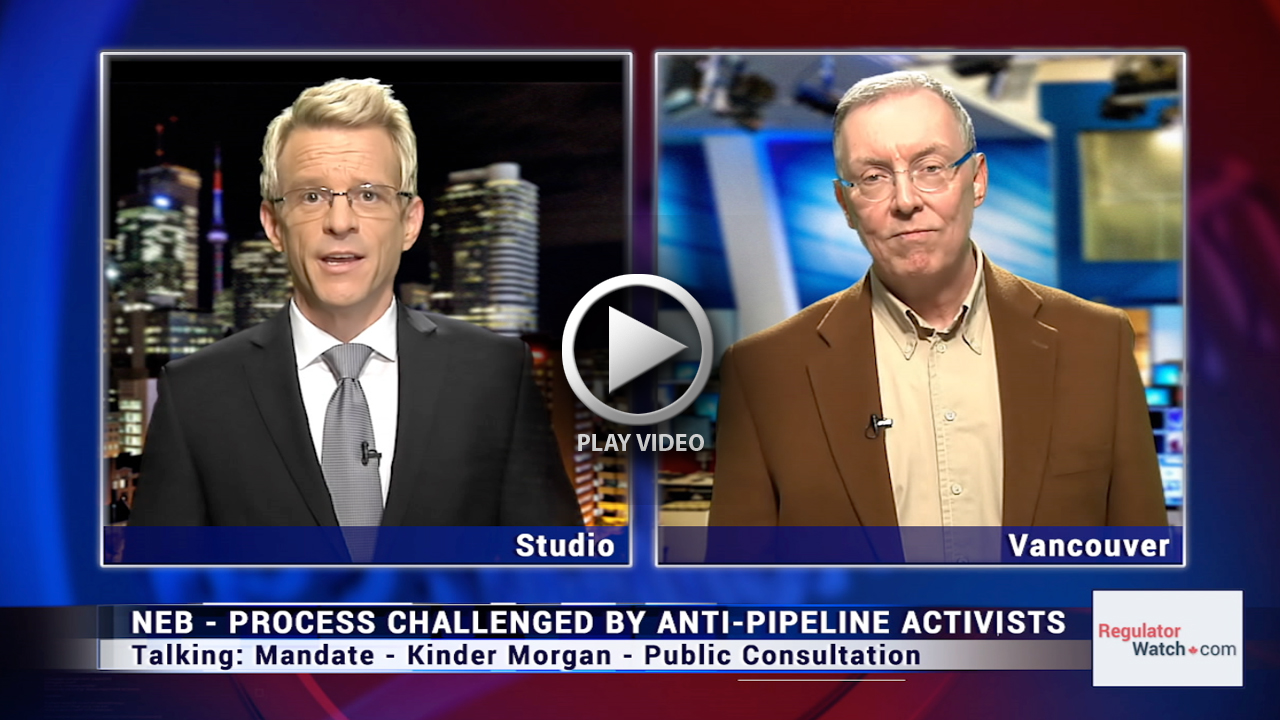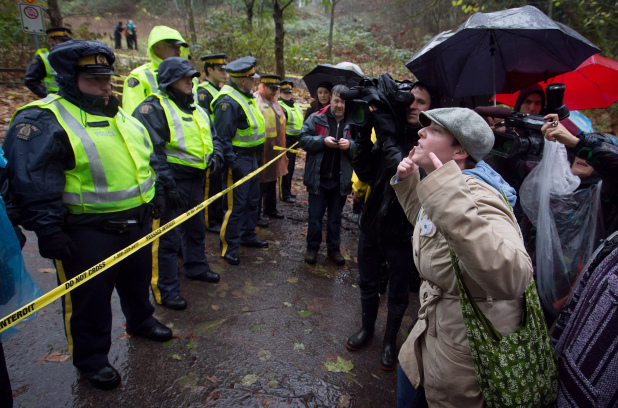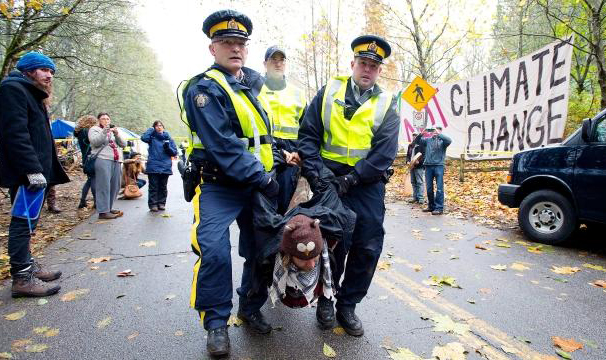(RegWatch Original) – Facing unprecedented scrutiny and criticism about its role in Canada’s energy economy, the National Energy Board is taking action to bolster its battered public image. Early this year NEB Chair and CEO Peter Watson kicked off a cross-Canada engagement initiative with the stated purpose of better understanding “what Canadians are thinking when it comes to pipeline safety and environmental protection.”

(Todd Korol For The Globe and Mail)
Watson, who became Chair and CEO of this Calgary-based regulator in June 2014, has committed to consulting on these two topics with the widest possible range of interested parties in every province and territory — including local government, Aboriginal organizations, and first responders (such as fire fighters and police).
The NEB also invited the general public to connect, via an online ‘soapbox’ where people are posting comments, debating ideas, and in some cases venting frustration about this regulator’s mandate. The tour is planned to continue into May 2015 and a report summarizing input is promised for early 2016. According to the regulator, this is just the first phase of a three-year outreach plan to restore confidence in the NEB.
Watson also announced that the Board is opening regional offices in Montreal and Vancouver in spring 2015, an unprecedented step that Montreal Mayor Denis Corderre called a “total change of culture in the institutional world” and an indication of this regulator’s willingness to be more sensitive to local interests.

Controversy has surrounded projects reviewed by the Board, and its decisions, since it was created in 1959. But rarely has its jurisdiction to carry out its duties prompted as much public outrage as in recent years with oil pipeline projects such as Enbridge Northern Gateway, Energy East, and Trans Mountain Expansion Project.
Climate Change Pressure
In the ongoing review of the $5.4 billion Trans Mountain project, for example, the NEB finds itself portrayed by some climate change activists as an enabler of fossil fuel development expansion, rather than a custodian of the public interest.
Not all of the criticism has been fair, or valid — reliability is 99.9998 per cent on the 71,000-kilometre network of pipelines regulated by the NEB — but it illustrates the unprecedented challenges the regulator faces as it works to carry out its mandate.
The City of Vancouver applied, unsuccessfully, to Federal Court for a ruling to compel the Board to consider upstream greenhouse gas emissions — those produced in the Alberta oilsands — as part of the NEB’s hearing of the Trans Mountain project. A related challenge of the Board’s jurisdiction over local government, by the City of Burnaby where the western terminal for the existing Trans Mountain pipeline is located, was dismissed late last year.

One persistent narrative in the Trans Mountain project hearing is that the format of the hearing itself is frustrating a full review of Trans Mountain’s 15,000-page application. A written, rather than oral hearing (which was the federal government’s decision) is muting the ability of Intervenors to question the company about its application, as the story goes.

Regulator Watch decided to evaluate that claim against the NEB’s own records for the Trans Mountain hearing. We also decided to explore in a bit more detail the emerging public sentiments that have prompted this regulator to look for new ways to connect with Canadians.
* * *
Protests of logging, mining and oil and gas development have been a hallmark of British Columbia’s political environment for decades. Invariably, however, those protests happen in far flung locations where the fight is over a population of albino bears, an old growth forest or the location of a mine. In those places, only the most motivated of non-local protesters and well financed of media outlets can join the melee. Rarely, if ever, has BC been witness to a similar sort of protest in the most populous corner of the province.
Kinder Morgan Canada applied to the NEB in December 2013 to twin its existing 1,150-kilometre Trans Mountain pipeline, which carries primarily oil from a terminal in Edmonton to one on Burnaby Mountain in the heart of the Lower Mainland. As part of the hearing for its project, Kinder Morgan was drilling a handful of holes into Burnaby Mountain to determine whether geology of the mountain would support underground installation of a section the new pipeline. An underground route through Burnaby Mountain would spare residents the disruption of dug-up roads and properties.

Instead of welcoming this innovation, however, climate activists gathered at the drill site to voice outrage that the work would proceed at all. Police acting under a court-ordered injunction to maintain the peace were harassed, spat at, and had garbage tossed at them. Kinder Morgan contractors were bullied, threatened, and screamed at.
The authority of the NEB, a 55-year-old quasi-judicial federal agency that regulates energy trade and energy infrastructure, was rejected. So was the authority of the federal government and the B.C. Supreme Court.
Even the Canadian Constitution was challenged, as the City of Burnaby attempted to use the court system to overturn sections of the Constitution that make it clear that municipalities have neither legislative autonomy, nor any jurisdiction over federal or provincial agencies.
All of this maneuvering has been happening well in advance of any decision by the regulator to allow Kinder Morgan to build its new $5.4 billion pipeline. The NEB’s Trans Mountain hearing is not expected to conclude until October 2015 and no decision is expected before January 2016.
* * *
The regulator has 12 issues to consider for this hearing. Many of those have an environmental component, such as potential environmental effects and cumulative impacts, or prevention of spills from oil tankers moving through Metro Vancouver’s Burrard Inlet.
Climate change impacts associated with expanded oil development in Alberta, the so-called “upstream” impacts that are not directly associated with pipeline construction, are excluded. That wasn’t the regulator’s decision. It was Ottawa’s. Nonetheless, the exclusion has left the NEB with a problem for which there is no remedy except to endure the dissent that has been stirred up about its hearing process for Trans Mountain. In the narrative of the Burnaby Mountain protesters, no expansion of fossil fuel development can be tolerated, anywhere, ever.

* * *
Two days after Kinder Morgan pulled up its drill and hauled out its equipment, project opponents lingered on the mountain celebrating what they described as a “victory.”
But for whom, and over what?
The regulator continues to hear Kinder Morgan’s application, which would increase capacity on the Trans Mountain system to 890,000 barrels of oil per day from Alberta to a storage tank farm on Burnaby Mountain and a marine oil shipping terminal at the foot of the mountain.
The expanded pipeline would allow Alberta oil producers to break free of a North American infrastructure bottleneck that compels them to sell their product into the US midwest at a significant discount to similar quality oils that have pipeline connections to tidewater elsewhere in the world.
For the NEB, the framework for the assessment is straightforward. The regulator must determine that Trans Mountain Expansion Project provides economic benefit to Canadians, that no communities along the route would be unreasonably disrupted by the project, and that the environment would protected during construction or subsequent operation of the line.
In its application, Kinder Morgan tells the NEB that overcoming the North American infrastructure bottleneck would allow Alberta oil producers to escape the infrastructure bottleneck and put about $18.5 billion of new taxes and royalties into the Canadian economy over the first 20 years of operations on an expanded Trans Mountain pipeline. It says the $5.4 billion project would be the primary source of construction work for nearly two years in communities along most of the route.
* * *
A review of the list of Intervenors for the project shows that the NEB included a number of expert environmental critics, including the science-based Watershed Watch Salmon Society, conservation project specialists Georgia Strait Alliance, and prominent international climate researcher/Green Party MLA Andrew Weaver. The NEB even decided that two representatives of Friends of the Earth-US, one from San Francisco and one from Bellingham, had something to contribute. A reputation for constructive criticism and reasoned dialogue with opponents is a common denominator with these Intervenors.
* * *
One persistent narrative is that the format of the hearing itself is frustrating a proper review; that a written rather than oral hearing process has denied the public the opportunity to grill Kinder Morgan in front of an NEB panel. (Again, this was a decision from Ottawa).
Although there are oral components to the hearing, such as a recounting of traditional evidence by Aboriginal groups, Trans Mountain intervenors are largely restricted to submitting written questions about the 15,000-page application to the NEB for response by the proponents. At the recent Enbridge Northern Gateway hearing, by contrast, the proponents were asked questions in a quasi-judicial setting.

The federal government chose the Trans Mountain format with the intent of streamlining a regulatory process to include tighter timelines — and counteract Canada’s growing international reputation as a jurisdiction where the process leading to a decision about a private sector investment has become unnecessarily onerous. Only time will tell whether this change has been effective. In the interim, here are some numbers to mull.
The NEB granted Intervenor status to 400 individuals and groups for Trans Mountain Expansion Project. A Regulator Watch examination of Intervenor filings on the NEB website show that 122 Intervenors took advantage of their opportunity to question Trans Mountain about its project — more than 10,000 questions were asked in writing in the first round of the process. In the second round of questioning, 69 Intervenors participated, asking 5,700 questions. That means at least half of those selected as Intervenors by the NEB have not exercised their opportunity.
Regardless, even by NEB standards this is a lot of questions — although perhaps not as many as the NEB was prepared to allow.
Scott Simpson – RegulatorWatch.com – April 17, 2015
Scott Simpson is a Sr. Writer & Analyst for RegulatorWatch.com
He is a Metro Vancouver communications consultant, working with clients in the energy, resource and public policy sectors. Previously, Scott spent 32 years as an award-winning reporter, columnist and editor at the Vancouver Sun, including a 10-year stint as a business reporter where led provincial coverage of regulatory affairs.













What I don’t like is the impression that decisions have been made prior to so-called public consultation. It seems to go through the motions only to justify the rubber stamping of Harper’s policies!
John, great comment. I am interviewing NEB Chairman Peter Watson tomorrow and I’ve included your comment as a question to the chairman. I’ll get you an answer and report back. Make sure to follow us on twitter @RegWatchCanada
only if independent environmental inspectors/monitors are used exclusively, hired directly by transmountain out of corporate office in calgary, I have my own environmental company and want fair/equal access to the opportunities (skemtsin environmental inc.)
Hi Sid, if Trans Mountain does the hiring directly how does that make the environmental inspectors/monitors independent? I would surmise that opponents to the pipeline would argue that they are not. Thoughts?
I have worked where the proponents have hired directly, independent, answer to the government (MoE) and meet with the proponent each day to discuss issue on the ground, with the power to shut down the project if need be, works, been involved in pipeline job worth a billion dollars, this model works well
Great comment Sid. Canada does have a strong regulatory process. Not to say things can’t go wrong. But on these sites there can be up to a dozen agencies that each could shut down a project at any time.
and so it should be the case, projects can and should go thru but not at the cost of the environment, this is the price, why should corporations and stakeholders take millions in profit and not have to pay for locals to earn a good living, protecting their lands ensuring the next generations, can enjoy the great outdoors and all that goes with it…
Sid, agree. Usually these projects bring huge economic benefits to the regions they work in. Lots of good paying union jobs. Go skilled trades!
The pipeline is bullshit put the refineries with the oil transport finished products only keep the jobs here and tax the fuck out of them to create permanent work, why should one corporate company profit while 50 million people suffer from health issues and environmental damage not right Harper you commy bastard
I interesting that the article and video made no mention of the hundreds of written questions from local governments and others that proponents are not answering. When you have open public meetings it’s much harder to avoid not answering important questions.
Totally ignored all the First Nations input and everyone else and rubber stamped it anyways
Scott, I get ya. I bet the reason why some of those letters are not directly dealt with is because not everyone, nor is every local government automatically granted intervenor status. There’s a bunch of reasons for that. Just today we conducted an in-depth interview with Peter Watson the Chairman of the NEB. We asked him all about your concern. We will be releasing the video starting Monday. Follow us @RegWatchCanada and watch for the release Monday. Yikes, i still gotta edit it! Cheers b…
I get it but MLA Weaver, City of Vancouver, City of Burnaby alone have had hundreds of questions not answered during this process. I will stay tuned and I do appreciate the conversation.
Yup! We got him to talk specifically about the jurisdiction issues and about how people feel they are not being heard. Great comments. Keep them coming!
All studies should be done by independent inspectors, by the way I was taught that we live in a democracy, but we get dictated to, all laws and environmental issues should be voted on, government officials are just supposed to advise us how to vote, but not in a dictatorship then Harper makes the laws, get him to live on the pipeline
There’s a lot to unpack with your comments Dale. First, I’d say that democracy does not mean people get to vote on every decision and all government is there to do is to advise “the People”. No way! All democracies are about “representation”. When you vote for a candidate, you are voting for that person to be your representative. To essentially vote in the decision making process on your behalf. And, when you call Harper a dictator, he’s not. He’s simply the Prime Minister of Canada, who leads a majority government under the Parliamentary System. Meaning, a majority government, any majoprioty governmnet no matter which party can ram through whatever legislation they want. The Opposition in a majority government is simply a loud bystander. I’m not saying Harper is the best thing since sliced bread. But, I am getting tired of all this “dictator” rhetoric. Trudeau and Chrétien rammed through whatever they wanted. So did Mulroney. Great comment Dale!!
Hey guys, RegulatorWatch just launched! Gotta build our twitter followers. Follow us @RegWatchCanada
All the gutted environmental laws and the Fisheries Act to streamline the approval process, no pesky laws in place to protect the environment . Now with Bill C-51 they can arrest and jail all protesters against the pipelines and put them in the same category as ISIS . Now they are domestic terrorists . How did the country get so far in the toilet with this government .
Taylor, you are right there has been some streamlining of environmental laws. Overall though, my personal belief is the environment is not in danger. But, Im open to arguments about why that position is in correct. Can you point to some examples of reduce legal oversight that is the most egregious… b…
Streamlining , it’s more like non existent anymore , everything is rubber stamped with no debate or the input from First Nations is totally ignored . How is that democratic
Taylor, the amount of consultation with first nations is mind boggling. Those who say first nations are being left out of the process don’t have clear picture of the truth. And with recent Supreme Court rulings the de facto situation is now complete first nation rights over the crown. BTW: I myself am first nations.
im sure they talked with them but their input is ignored most or all the time
Yeah, it’s tough to say. There have certainly been times it was really bad. Old days they didn’t care a bit. I believe things have really changed though. In the end, it must be said, even after all the consultation if it’s seen to be in the country’s good, then i believe government can still force something through. Frankly, I agree with that. Only after real and lengthy consultation has been done though.
I think to much fear mongering has hindered First Nations dialogue about their future. The bands around Fort McMurray have capitalized and have good jobs and good corporate help from the oil companies. They are also are getting their message heard about which locations need protection. Us it perfect? No. But the bands are engaged. This viewpoint that seems to be covered from bands along Gateway and Trans Mountain is a refusal to engage in talks. How do you comprise with someone that will not talk to you?
Yup Greg you have it about right. The Lower mainland bands are harder to deal with in terms of activism. Mostly, i believe that is also because they are closer to the urban centre so therefore closer to all the environmental activist. Who we all know get more of their operating money for foreign company, non-profits and individuals than Canadians. The entire enviro movement would be out of luck without foreign money. Makes me laugh every time i hear critics complain about foreign corporations. When on the other side its huge foreign money too.
The changes made by the Navigable Waters Act was a shameful move by the conservatives to indirectly rubber stamp pipelines and energy projects by stripping protection from many lakes and waterways just because they aren’t ‘commercially viable’. Combine that with the woefully inadequate cleanup response to the minor oil spill from a ship’s fuel tank in Vancouver and you have a clear example of why people should be scared. When a clean-up response that is a day late and only cleans up 80% of the spill is considered world class, it just demonstrates that we are working with woefully inadequate standards and environmental protection. This spill illustrated that “World Class” really only means “slughtly better then the rest of the world’s incredibly low standards. And how is anything to do with this process impartial when the Con’s are dumping millions into advertising on behalf of the oil companies? The NEB isn’t ” evaluating” the pipelines. Our federal government and the agencies and laws in place to protect the public interests have been watered down or turned into sales people for the oil companies. That is the problem.
34 billion in corporate subsidies to oilsands companies that are mostly foreign owned
Ramtin, good comments. I do believe though that the NEB is genuinely interested in ensuring safe pipelines. I just finished producing a half hour interview the chairman of the NEB. I’ll be posting the link shortly.
Die hard extremist’s on both sides will not comprise. These minority’s are overriding the good centrist positive that benefits everyone while protecting the environment. Good critics are needed to get the best pipeline and tanker safety protocols. Unfortunately the Oil Sands have been vilified. Do they need to be better? Absolutely!!! Did you know there is ONE coal power plant in GA that produces the equivalent if 75% of the ENTIRE Oil Sands CO2 emissions? And this plant is expanding!!! Where are the protests? Where is the President? This shows that to many of these protestors are politically charged and are using the environmental causes as justification to make noise!! These protestors should be blocked from intervenor status!!
And just let foreign corporations do whatever they want right
If you have investment’s you are almost certainly an owner also.
So many issues; too many BA’s in BS. At least these particular Harper haters can actually define their angst…the vacuity is problematic…
Greg, I agree with you 100% that it’s become too polarized. Too much on the extreme. Oil & Gas isn’t going away any time soon. So mitigating the impact is important.
Taylor, there is nothing wrong with foreign owned corporations. To be blunt, it’s a stupid argument from opponents. For one, Canadian corporations do more business int he U.S. than any other country. We are the “foreign owned” company in the U.S. in so many industries. So, if we were to prevent U.S. companies from doing business here they would do the same. That’s sheer idiocy. It would bring our economy down. So o rail against foreign companies is rhetoric only. And, not to mention if we were to stop foreign companies from investing and working in Canada you could not singles out just resource companies it would be all of them. Every industry. Nuts. If we did, I would insist then that no foreign non-profit group should be allowed to operate in Canada and advocate their positions here. Most of the $ spent in the battle against Canada’s natural resource industry comes from foreign non-profits and donors.
Nope not buying it. Foreign controlled companies should not have a huge influence on Canada’s resources and who gets them . Who sponsors this site ?
Taylor if you think that please examine Quebec. They go out of their to disallow foreign investment but encourage their companies to buy abroad. Quebec companies own hundreds of billions outside Canada. Should this be disallowed also? Quebec has since enjoyed the luxury of the rest of Canada paying a substantial part of their bills.
Hi Taylor, we don’t have sponsors. This site is solely owned and back by me and my business partner. I’m a 25 year television broadcaster in Vancouver. All view points are welcome and encouraged on this site.
Foreign corporations buy our politicians….
No pipelines=more rail cars. Canada has had Megantic already, which was carrying crude from North Dakota when it derailed……when developing a pipeline, or even some of the newer extraction methods, money should be spent on research to come up with technology to minimize impact to the environment, especially in the event of a failure of equipment. To simply protest against something without an alternative is negative and defeatist….
Bruce, I totally agree with you. Fact is tens of thousands of miles of pipelines already cross cross North America. And if there were inherent failure issues then pipelines would be breaching all the time. They just don’t. It’s the absolutely the safest way to transport hydrocarbons, both for people and the environment.
Hey guys, thanks for all the comments. Keep them coming. Please like our page and follow @RegWatchCanada – Happy Saturday!
Sadly the lefty enviros don’t get that the pipeline is needed
Retards would rather toxic materials be shipped plane, train, truck, or tanker and have the added risk of a spill!
The lefties would rather have the government hand them everything as opposed to having to go to work for it. They sometimes forget that our entire economy and way of life is built around energy.
Build the dam pipeline! Gateway and the Keystone, let’s start shipping product so that the oil and gas can survive for a couple of more years. Then kill it with a carbon tax, sometimes the smartest people are the biggest criminals! Build rail cars? It’s not the rail cars that are the problem it’s the rail track itself. The pipeline is the safest way, railways with all there failures promote more pipelines.
You bet John pipelines are the safest. There is no denying that. Interesting point to note, that the first oil pipeline that was built was done so by a consortium of independent oil men. The working men, who owned their own wells. They were being squeezed out of business by the colusion between the railway companies and Standard Oil. Pipelines are break the stranglehold of the rail way robber barons.
Before you protest against oil, go to university, develop a viable alternative, test your product, then convince the continent to change how they think about transportation. It can be done, PLZ don’t view this as negative, but to change the world the right process needs to followed. When having no option to suggest, you only make yourself look unprepared. I’m sure somebody must have the ability to recreate the Tesla Coil?
Cory, the Tesla Coil, nice touch!
Well the thing is most people do to have the means to do that because of giant corporations holding us back in technology.
Pipeline companies have pathetic safety records concerning spills , I don’t know where you guys are getting your info from or is just more propoganda